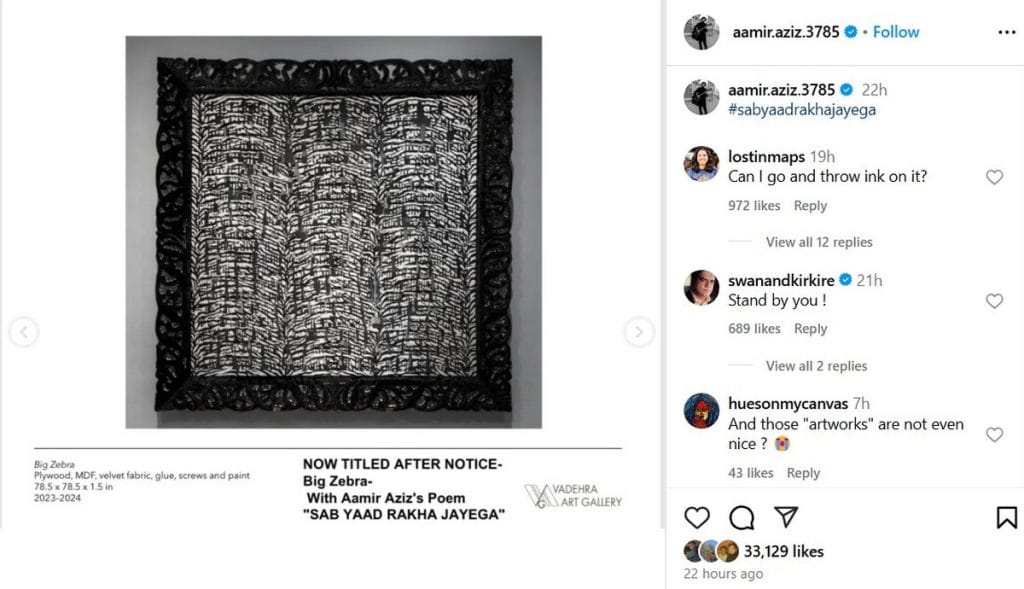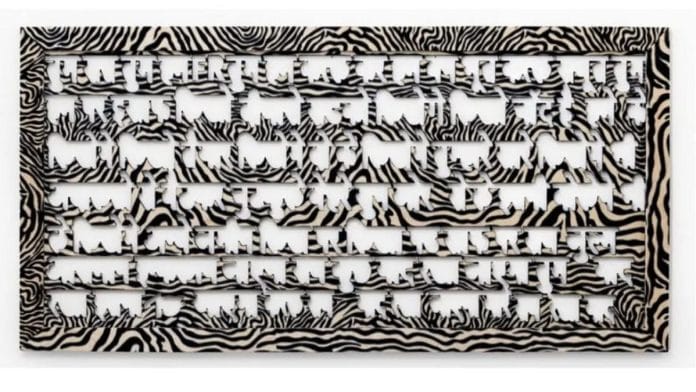New Delhi: An artist, a poet, and an accusation of theft. Velvet artwork featuring ‘Sab Yaad Rakha Jaayega’, a poem that became an anthem of anti-CAA rallies, has landed in controversy. Poet Aamir Aziz has accused artist Anita Dube of misappropriating his words in a piece displayed at Delhi’s Vadehra Art Gallery until last week.
In an Instagram post on Sunday, Aziz called out Dube for “outright cultural extraction and plunder” in her works Old Zebra and Little Zebra, alleging she used his work for monetary gains and gutted his voice in the process.
“The poem raged against injustice. Anita Dube turned it into a luxury commodity—proof not only that injustice is alive, but that it now wears silk gloves and sells itself as art,” he wrote.
Aziz’s emphatic statement and the support he’s received have ignited a conversation on artistic boundaries and who profits. While credit was given to Aziz — both in the wall text and artwork captions — his consent was never taken. According to Aziz, he didn’t know his work was being used until a friend visited the show.

On social media, a number of young creative practitioners have written in Aziz’s favour.
“It depends on where you’re seeking inspiration from and where you’re using it. The purpose of that poem or piece of art was for the masses. And that feeling of expression was taken from the masses and put it in a white cube space for the elite,” said Harsh Sharma, a young artist.
Dube, who typically experiments with text in her work, denies intentional wrongdoing.
“The intent of quoting words from Aamir Aziz’s poem was to celebrate them. I realise that I made an ethical lapse in checking with Aamir using words from his poem,” Dube said in a statement, a copy of which has been accessed by ThePrint, adding that she was “in love with the poem.”
Her usage, in effect, was supposed to be an homage. Instead, it culminated in a legal fracas, with Aziz sending her a legal notice. Since then, both the art gallery and Dube have stated that the works featuring the poem will not be for sale.
However, that’s not necessarily enough.
“Attribution is a small concession. Attribution doesn’t matter if you don’t have consent or permission,” said an industry insider who did not want to be named. “Express permission needs to be given, alongside a license and a monetary fee. It’s rare for someone to waive that.”
Also Read: ‘Educated Dalits’—how these two words swung Bombay HC landmark verdict for 2 JNU scholars
‘Spirit of the Commons’
Dube’s work has always been political. Other than Aziz, her exhibition features quotes from a varied mix of thinkers, from bell hooks and Martin Luther King Jr to BR Ambedkar.
“As a visual artist I work with materials that I love. “Haman Hai Ishq mastana, haman ko hoshiyari kya [I am so intoxicated on love, what forethought could I have] is a good way to describe this,” she said in her statement. “It is the lost old world where there were fellow-traveller solidarities, spirit of the Commons and Copy Left.”
Both Dube and Vadehra, however, have admitted to oversight when it came to seeking permission.
“There was a lapse in checking with Aamir Aziz beforehand. Hopefully, this is understood, and we can come to a fair resolution,” gallery director Roshini Vadehra told ThePrint.
For curator Alka Pande, Aziz accusing Dube of theft is an inaccurate representation of events.
“Theft happens when you don’t give due acknowledgement. Even the best writers are inspired by the work that’s been done before them,” she said. “These are opaque, porous borders. This was about a movement where so many people were involved.”
However, she added that due credit must be given, and a collaborative process must be followed.
“If there is a financial aspect to the work, then the financials should be clear between collaborating parties,” she said.
Pande referred to it as part of the process of creativity, where activism, propaganda, and politics coalesce.
Also Read: India privatised Amrita Sher-Gil’s story, ignoring Hungarian roots. Delhi exhibition reclaims it
Velvet underhand?
This isn’t the first time Aziz’s work has been woven into Dube’s art. A 2023 exhibition titled ‘Of Mimicry, Mimesis and Masquerade’ also used lines from Sab Yaad Rakha Jaayega. Aziz claims Dube never mentioned this during their first conversation — a deliberate omission, in his view.
“This is my poem, written in velvet cloth, hung inside, a commercial white cube space, renamed, rebranded without ever telling me,” he said. “This is not solidarity. This is not homage. This is not conceptual borrowing. This is theft. This is erasure.”
Meanwhile Roshini Vadehra reiterated the gallery’s commitment to representing “strong, political creative expressions”.
“We believe in giving a safe space for creative practitioners to have thoughtful, meaningful and respectful dialogues, and we will continue to do the same,” she said.
The gallery represents several artists whose works are rooted in political movements and identities.
Copyright law includes the doctrine of fair use, which allows work to be used in limited ways without prior permission. But this case doesn’t fall into that category, since the artwork wasn’t for research or cataloguing — it was initially for sale.
But Pande reiterated that this is part of a wider creative tradition.
“So many people use these things. They become political. This [the poem] is a whole part of the CAA.”
Until it was “written on a velvet cloth.”
(Edited by Asavari Singh)






